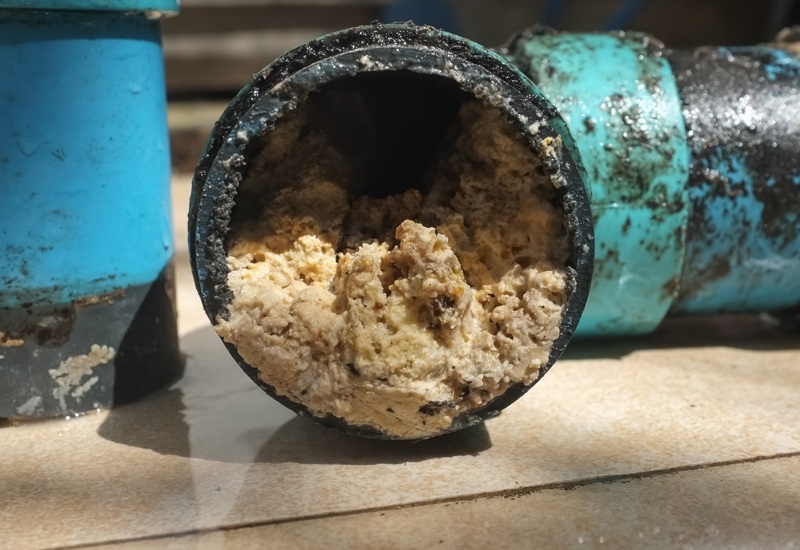
A pipe clogged with thick fats, oil and grease
Where Does FOG Come from?
Fats, oils and greases are a natural by-product of cooking and food preparation. They are found in many food products including shortening, butter, margarine, dairy products, baked goods, eggs, dressings, sauces, coffee, meats, food scraps, and more. Washing dishes that once held these products and running FOG-ridden items through your garbage disposal can all contribute to FOG buildup.
FOG’s Effects on Plumbing & Sewers
FOG can clog plumbing pipes and sewer systems similar to the way cholesterol clogs your arteries. Fats, oils and greases are insoluble in water. Dish soaps won’t help. Worse, as FOG cools, it floats on the surface of sewer fluids and solidifies on pipes. As a result, pipes may need to be cleaned more frequently or replaced sooner, before they become completely blocked and cause a sewage backup into your home or overflow onto streets. When FOG causes plumbing problems such as these, contact your local Mr. Rooter® plumber for plumbing repair services.
How to Properly Handle FOG
You can help protect both Mother Nature and your home environment by properly disposing of fats, oils and greases, which will also prevent sewage overflow from contaminating waterways and your home.
Follow these steps to ensure FOG-free plumbing:
- Caution: Never pour FOG down the sink—even waste disposal units cannot properly handle fats, oils and greases. Use a sink strainer, disposing of as much food as possible in the food bin or BROWN BIN.
- Contain: Save FOG, such as bacon grease and meat drippings, in containers with lids where they can harden and congeal for recycling or disposal in the garbage. Used glass jars, large yogurt containers, empty plastic butter tubs and coffee cans are great for this. Once cold it can be disposed of in your GREEN BIN.
- Pre-clean: Scrape greasy pans and left over dishes into the food bin, BROWN BIN or compost. Wipe them with a paper towel or newspaper before washing in your sink or dishwasher.
Dispose and recycle: Composting bins and recycling drop-offs are great places to dispose of FOG. They can be recycled into biofuels or re-used in the form of gardening compost. Check with your town or city council for solid waste disposal programs that accept used cooking oil. - HOT DRAIN: Once you’ve cleaned off your frying pan etc and you’ve drained your sink or basin, refill the basin to the brim with as hot water as you can manage. Once it’s full up, pull the plug and the heat and weight of water will carry most of the excess into the main drain.
- Hot Run the Shower while you’re drying off: Thick shampoo, conditioner and shower body washes can easily clog a drain. You know the stuff, when it drops on the floor it’s like yoghurt, it takes you rubbing it with your foot and spraying it directly for 40 seconds to make it go away. That sticks to the pipes like cholesterol. So when you’ve gotten out the shower and are drying yourself off, turn the shower on to max heat and let it run for the time it takes you to dry yourself off and the heat will carry the excess soaps away.